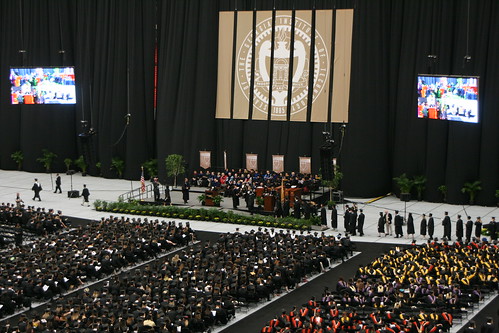Tuesday, November 29, 2011
Hate for the middleman
There's a debate going on about whether to allow foreign retail chains to operate in India. There are libertarian voices who, by principle, are aghast at the thought of imposing needless restrictions. Urban Indians view retail FDI favorably mostly because they like the idea of having more joints to shop in. Yet the majority of the folks I have come across seem to embrace a protectionist view that invokes dire consequences for everybody if these retail chains come in. I have been more intrigued by how people have been taking sides of some perceived victims while inexplicably abandoning others.
People talk about the three separate characters that have a role to play in the FDI drama; the farmer, the middleman and the retailer. As expected, folks view the farmer most sympathetically. He's the innocent, hard-working soul barely making ends meet. Of course, for this argument, nobody is thinking of the rich areca growers that populate my village or the spoilt coffee planters in my neighbouring town because that would completely spoil the narrative. The retailer too has earned his share of the pity. FDI will take away his livelihood and that would be sad. The stereotype here is the neighbourhood kirana store guy your mom loves to haggle with, who despite his thrifty ways is invested in the community for the long term. The third player, the middleman, for some strange reason gets no backers at all. He is always caricaturized as the scheming opportunist who needlessly drives up costs of your provisions and screws the farmer all at once. People are definitely not thinking about the mandi owner in Tarikere who is taking enormous risks in keeping his unpredictable, erratic income flowing in, while vitally providing a conduit for the farmers' produce to make it to the markets. Despite doing exactly what the retailer does - buying at a cost and selling with a margin - nobody spares a thought for how the Walmarts and Tescos will definitely drive him out of work. There's something about our innate sense of ethics that makes us hate the speculator who makes his money without putting a regular amount of work every day.
Sunday, November 20, 2011
Death of a really good salesman
Apple did a lot of things right, most important of them, I admit, was to build exquisitely designed products. But a lot of their success owes to a brilliant marketing effort too. It convinced people that they could, at a starting fee of USD 199, join an exclusive club. Even today my twitter feed has a steady stream of smug comments from Mac users subtly indicating that they know something that others don't. The company also perfected perceived obsolescence; you would feel the greatest gratification when you bought their latest device but feel equally unsatisfied when they released the next version, in the process keeping you panting on that hedonic treadmill. In Jeffrey Sachs's words they qualified as a great company because "they manufactured wants".
In typical cult-like response Apple consumers went overboard with their tributes to Jobs when he died. I lost track of the number of people who compared him to Edison. Vaclav Smil does a better job than I could hope to do in putting that claim in perspective, but the best counter came from Prem Panicker "Edison changed lives, Jobs changed lifestyles".
What Occupy Wall Street tells me - early days, of course - is that civilization may finally be reaching that inflection point when people stop identifying themselves primarily as "consumers". In that new order Jobs's legacy might not really age all that well. I think that will be a good thing.
In typical cult-like response Apple consumers went overboard with their tributes to Jobs when he died. I lost track of the number of people who compared him to Edison. Vaclav Smil does a better job than I could hope to do in putting that claim in perspective, but the best counter came from Prem Panicker "Edison changed lives, Jobs changed lifestyles".
What Occupy Wall Street tells me - early days, of course - is that civilization may finally be reaching that inflection point when people stop identifying themselves primarily as "consumers". In that new order Jobs's legacy might not really age all that well. I think that will be a good thing.
Thursday, November 10, 2011
Political Debates
My favorite political debates of all time were those that preceded the confidence motion before the Vajpayee government was ousted from its second term in 1999. Watching the likes of Pramod Mahajan, Somnath Chatterjee and George Fernandes take the floor was such a joy, but nobody could put you in a trance like Vajpayee could. Even his seemingly unending pauses were filled with such a sense of anticipation. I'm glad that he lived in a time when TV coverage was merely incidental and not the primary objective. A perfect example of the latter is the republican debates happening here in the US right now. Candidates are asked to sum up their thoughts on healthcare in 30 seconds. 30 seconds!! That's one half of a Vajpayee pause.
Anyway, TV stations want to make the debates as exciting as possible for even an audience that is not interested in politics. I must say it makes for interesting viewing. Since it's not really an arena to discuss policy and ideology, you might as well enjoy the soundbytes, canned talking points and a lot of veiled personal cheapshots. Some comedian said that when people watch an airshow they are really wishing for an air-crash. Well, that might be sadistic when applied to airshows, but in debates such wrecks make compelling viewing. Yesterday, the audience must have prayed really to make this happen.
Tuesday, October 18, 2011
Things I'll miss in Thanjavur: Big Temple
It could be the knowledge that it has served its function for a full thousand years. It could be that it brutally dwarfs everything around it. It could be that it reminds us of an empire that was far ahead of its time. You don't have to be a theist to appreciate that there's something magical about the big temple at Thanjavur.
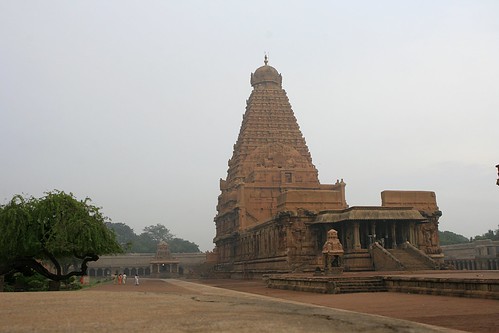

Labels:
thanjavur
Monday, October 10, 2011
Things I'll miss in Thanjavur: Basketball Courts
For a town of this size Thanjavur has a surprisingly high density of basketball courts. My favorite, though, is the one in the Medical College campus. In what other court would you find cheerleading peacocks?
Labels:
thanjavur
Pulicat
View Larger Map On a cue that we might get to spot flamingoes, we planned a snap trip to a place called Pulicat lake from Chennai. Pulicat lake is a massive lagoon on the border between Tamil Nadu and Andhra Pradesh. On the shore of the lake is a village called Annamalai Cheri that also, we were told, the name of the bird sanctuary. We missed prime birding time by not getting there early enough not just because our taxi driver was in no particular hurry to get there. The real problem was that there are no clear directions available. Most people even in the vicinity had no idea that there was a bird sanctuary around. We compounded the problem by asking in English; one guy thought we were asking for "parota" which in Tamil is also identified by "baroda", and another guy showed us where the "boats" were. The breakthrough came when I finally consulted a friend on phone to learn the tamil word for "bird" and we started asking "Paravai enge irkke?". For any one looking for information to get there, take the NH5 from Chennai, turn right at Panchetty towards Ponneri. At Ponneri, ask for directions to get to Annamalacheri. The last stetch of the road is treacherous. Getting there is hard but totally worth it. In our case we got to see the species we came looking for, the flamingoes
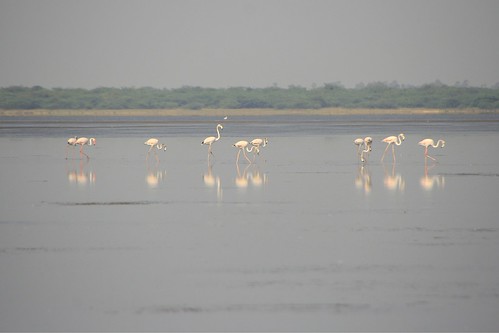
Sunday, September 04, 2011
Sohra (Cherrapunjee)
Sohra (previously known as Cherrapunjee) and nearby Mawsynram, both regions in Shillong are two of the wettest places in the world. Post-monsoons these valleys hold awe-inspiring sights consisting of lush green valleys, gorgeous hills and staggeringly beautiful waterfalls. This one, my favorite by a narrow margin, is called Nohkalikai, which according to Lonely Planet is the fourth highest in the world.
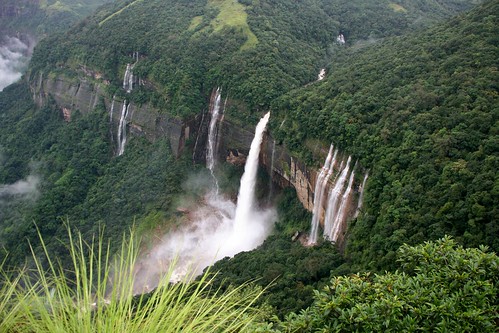
Our guide insisted that this one is called the "Seven Sisters" falls, but I am sure there is a nicer local name to it.
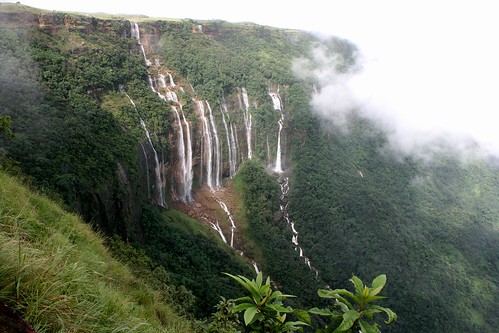
This one is called the Mawsmai falls.
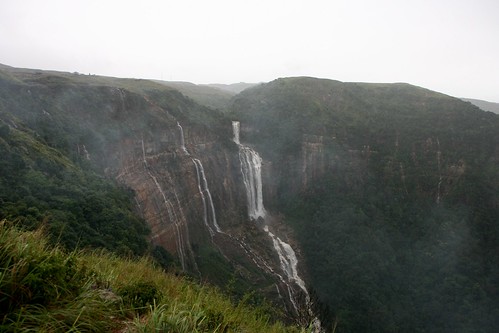
We were also privileged that on the one night we stayed at Sohra, the sky completely cleared up revealing a brilliant night sky.

Our guide insisted that this one is called the "Seven Sisters" falls, but I am sure there is a nicer local name to it.

This one is called the Mawsmai falls.

We were also privileged that on the one night we stayed at Sohra, the sky completely cleared up revealing a brilliant night sky.
Labels:
Meghalaya
Saturday, September 03, 2011
Root bridges of Meghalaya
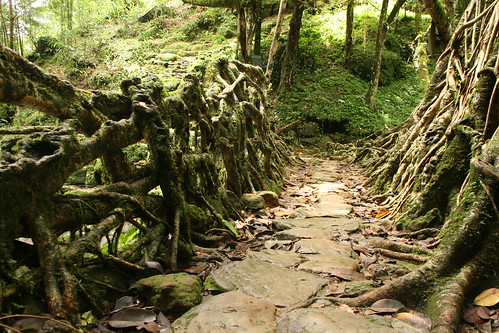
I've been late to post about my trip to Meghalaya. One of the most remarkable features that we encountered in the Khasi hills of this state are these living root bridges. In a practice perfected by the Khasi tribe, the growth of the secondary roots of rubber trees are guided by the use of betel-nut trunks to form, over the span of decades, bridges that can be used by humans to cross streams and rivers. You've got to see them to believe that this is even possible. To me, not only was the geo-engineering aspect marvelous, but it was heartening to see a community's long-term stake in its environment. The picture above was from a bridge near Mawlynnong. Notice that they even managed to shape the hand-railings! Near Cherrapunjee, there was also this fantastic double-decker bridge.
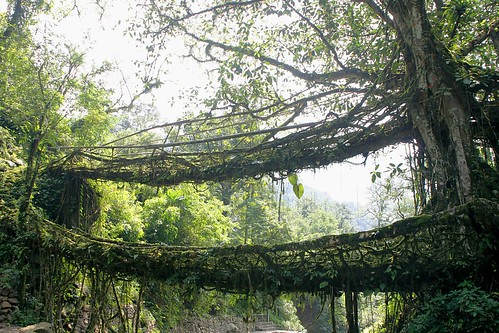
Labels:
Meghalaya
Monday, August 15, 2011
Thoughts on Independence Day
Sunday, August 14, 2011
Cycling to Shivagange
This morning, some ex-colleagues and I did a 100 km biking ride to Shivagange, a hill situated off NH4 towards Tumkur. The highlight of the trip was the first leg of the return journey when RD-man and I put in a burst that lasted 1hr 45 mins in which we covered almost 40 kms without a stop, on some beautiful stretches of country roads. That feeling of "getting in the zone", I think, is what makes cycling so addictive.
Friday, July 22, 2011
Kallanai
Last weekend, we made a trip to a remarkable place called Kallanai, a dam over the Cauvery river built by the Cholas nearly a thousand years ago. It is said to the oldest water regulation structure still in use today. More fascinating was this curious behavior by the fish at the downstream end of the dam. For some reason, they kept trying to swim upstream, at times jumping with all their energy to counter the rapids. Why they did this I have no idea, but the futility of their exercise lent a tragic touch to it all. That apart, the trip was a lot of fun. The rest of the photos are here.
Tuesday, July 12, 2011
The inaction of the good
What's common to every election manifesto, every political speech, every media interview with a neta, every excuse for a scandal? The incessant use of the word "Development". It's not necessarily a bad thing, but while the Yeddys of the world go about turning Bangalores into Singapores and Mumbais into Shanghais, I feel there are two counterforces that are absolutely necessary to keep it sane; environmental activism and voices speaking for social justice.
While the media was filling in as a bumbling champion for social justice, I feel that environment had long been ignored. Minister for Environment and Forests, Jairam Ramesh, I thought, was filling that gap fairly well. I blogged about him not so long ago, expressing my guarded appreciation. He seemed like a smart, erudite man, capable of dealing with ethical ambiguities, so crucial a skill in his role. He also seemed to do it all without the fanfare that's associated with someone like Shashi Tharoor. Most importantly, by all accounts, he seemed to assign the highest priority to transparency and accountability.
It wasn't a surprise that he was booted out his ministry yesterday for he had ruffled too many feathers. The surprise was that the PM's reason for the reshuffle was to "signal accountability". So it's goodbye to good hope for now. There will not be any twitter campaigns. There won't be candle light vigils. There definitely won't be media outrage. Sometimes I do wish Jairam Ramesh had operated like Shashi Tharoor too.
Sunday, June 19, 2011
The big R gets it right, finally!
My dad has his share of idiosyncrasies. He's got an absurd hatred for coughing. Although his mode of rebuke for non-compliance of the no-coughing rule was nothing but a frown-n-stare, I clearly remember a time in my childhood when I was actually scared of coughing when he was around. I probably still carry residues of that fear.
His other spoilsporty behavior comes from his almost irrational paranoia of water and its hidden dangers. He has a dire warning prepared for whenever I am going to a place that has a geographical feature that can hold more than a bucket of water. Yesterday as I was leaving for Bheemeshwari he delivered his usual doomsday address. As always, I shrugged it off and as always, dad hated it. When we reached our destination there was a warning board that adopted the same alarmist tone as my dad. Before I could shrug that one off too, I spotted this 6-footer basking in the water.
Definitely made my day. My dad's too!
Monday, June 06, 2011
The 10k run - edition 4
I want to believe that line from a Dylan song "I was so much older then. I'm younger than that now". Unfortunately, I can't say that about my finish times in the 10k (sunfeast 10k all these days, TCS 10k now) run over the last 3 years. Depressing!
Labels:
sunfeast10k
Monday, May 30, 2011
Auto-wisdom - Conservation edition
I've been wondering as much about the link between traffic-rule-adherence and water conservation as I have about the definite article before "Water". Tell us, pray, which water?
Labels:
autos
Monday, May 23, 2011
The Graduate
I remember when I got my bachelor's degree in an austere ceremony that involved our clerk handing out a modest certificate through a hole in the wall and then sliding out a register for me to sign in, all strictly done without eye contact. A far cry from the pomp and gaiety and cheering that surrounded my sister's walk.
One reason for the elaborate ritual is surely tradition, but I also think that this kind of trumping up has one of two contrasting outcomes for kids watching. On the one hand it does appear that the recognition and sense of occasion lends an aspirational value to education. On the other, it also got me wondering if the exclusivity would perhaps make it appear inaccessible to some folks. I don't know the answer. All I know is that even the silly hats couldn't distract me from feeling lots of pride.
One reason for the elaborate ritual is surely tradition, but I also think that this kind of trumping up has one of two contrasting outcomes for kids watching. On the one hand it does appear that the recognition and sense of occasion lends an aspirational value to education. On the other, it also got me wondering if the exclusivity would perhaps make it appear inaccessible to some folks. I don't know the answer. All I know is that even the silly hats couldn't distract me from feeling lots of pride.
The graduation was the first of a series of "Oh she's really grown up" epiphanies. The other high point of the trip was meeting my remarkable nephew (among other things he digs Bakasura and seemingly gets his nutrition almost entirely from suspended particles in the air). A doff of the hat to his parents for being awesome hosts and Florida guides.
Saturday, May 07, 2011
Thoughts on Alternative Medicine
Last week I happened to visit Kolli hills in the eastern ghats of Tamil Nadu, accompanying a friend who was deploying an IT solution for a rural health care non-profit called Isha foundation. While the cool mountain air was in itself an incentive, a welcome break from the Thanjavur summer, the trip was interesting in many other ways.
Isha Foundation has a unique approach to health care; as part of the Ayush program, they try to combine Indian traditional medicine with modern practices. It got me thinking about where I stand on the issue of using altenate medicine. As a philosophy I whole-heartedly buy the guiding principle of these systems, which as I understand, is to empower the body to fight illnesses rather than curing the disease or symptom directly. With its recent emphasis on preventive-promotive practises, I believe that modern medicine is going down this path too.
However, here are reasons I am unsettled by traditional practices
Isha Foundation has a unique approach to health care; as part of the Ayush program, they try to combine Indian traditional medicine with modern practices. It got me thinking about where I stand on the issue of using altenate medicine. As a philosophy I whole-heartedly buy the guiding principle of these systems, which as I understand, is to empower the body to fight illnesses rather than curing the disease or symptom directly. With its recent emphasis on preventive-promotive practises, I believe that modern medicine is going down this path too.
However, here are reasons I am unsettled by traditional practices
- Methodology: Alternative schools of medicine so overwhelmingly rely on axioms - Ayurveda's chakras, homoeopathy's dynamisation/potentisation - which by their very definitions become inherently unverifiable using conventional scientific approaches. Some even claim this transcendental pretensions to be the strong points of these systems.
- Faith: These schools rely on their practitioners' and followers' faith. There are several consequences of that mentality. For one, the onus of proof is on the skeptic. Conversely, any literature in these fields, as I gather, seem to be guided by strong confirmation biases because proponents seem to have reached their conclusions even before they have started the research. That's another reason why anecdotal evidence is so rife; everybody's got an uncle whose cancer miraculously disappeared! Faith also leads people to believe that there are no side-effects in alternative therapies. I would be very surprised if Ayurveda's reliance of heavy metals such as Arsenic and Mercury is completely healthy.
- Lack of openness: I'll be the first to admit that I'm a critic of several aspects of modern medicine. Antibiotic overdose, short-term curative approaches, influence of pharmaceutical companies etc deserve our disdain. Yet, science did come up with vaccination for small-pox, cure for polio, unbelievably complicated surgical practices, none of which were cracked by the all-knowing traditional systems for thousands of years. Somehow, all traditional practices seem to aspire for glory by disparaging modern medicine (including by using that condescending term 'Allopathy'). Empirical skepticism towards science is healthy and necessary, disdain is dangerous.
- Talent: Let's face it, traditional systems are not great at attracting talented people. How many of the smart folks (if intelligence is too subjective, think "perseverant" , "industrious", "resourceful" or any other adjective of your choice) you know from school actually wanted to go to and eventually went to these courses? The most passionate followers of Ayurveda and Homoeopathy that I personally know, I suspect, would advice their kids to take up MBBS over BMS if they are ever in a position to make that choice. What chance does that give these systems to produce a vibrant community of researchers and innovators?
Wednesday, April 13, 2011
Coke Studio
I have my own secret list of seven reasons why we should reunite with Pakistan which so far read like this
7. The Wagah gates could use a break from the slamming
6. K2
5. We wouldn't nuke ourselves, would we?
4. It will make Kashmiri separationists look awfully silly
3. We'll access that endless supply of uncannily gifted fast bowlers
To this list, I now add "2. Coke Studio". Coke Studio is a Pakistani TV show in which music artistes of different genres perform to produce some of the freshest sounds I've heard. I especially have been obsessed with Zeb and Haniya.
One more solid reason and we can have our own little "Tear Down This Wall, Mr.Gorbachev".
7. The Wagah gates could use a break from the slamming
6. K2
5. We wouldn't nuke ourselves, would we?
4. It will make Kashmiri separationists look awfully silly
3. We'll access that endless supply of uncannily gifted fast bowlers
To this list, I now add "2. Coke Studio". Coke Studio is a Pakistani TV show in which music artistes of different genres perform to produce some of the freshest sounds I've heard. I especially have been obsessed with Zeb and Haniya.
One more solid reason and we can have our own little "Tear Down This Wall, Mr.Gorbachev".
Labels:
depperecommends
Sunday, April 10, 2011
Almost a revolution
Just last week, I finished reading Eknath Easwaran's fascinating, if at times fawning, account of his mentor in "Gandhi The Man". I was still grappling with the impracticality of some of the ideas of Satyagraha when the last of the Gandhians decided to put together a little demo.
All sorts of people have commented on the goings on; the Arnab Goswamis have ruined their vocal chords by their declarations of a revolution, and on the other side, armchair intellectuals have been mourning the death of democracy. Probably as a consequence of reading a Gandhi biography so recently, I've been on the majority's side of this little show of hands. I've surprised myself at how many times I've questioned democracy over the last few days and I've been irritated at people who claim that Hazare should have used the provisions within the democratic system. The whole mechanism of civil disobedience, after all, is based on encouraging unconstitutional actions to upset an undesirable status quo. Why, then, should Hazare's "blackmail" be stripped of its context and judged by moral absolutes? If democracy is so unquestionable, why aren't we electing our judges and civil servants as well, for example?
Those questions at a philosophical level aside, I think the reason for the groundswell is that few Indians have escaped situations when we are forced to negotiate with our conscience. The last time I was in one such was when I had to get my tax refund. The babu clearly expected a bribe and I remember all that went on in my head. Should I refuse to bribe him and risk losing time and money? What if I end up jeopardising my consultant's relationship with the clerk? What really are my options for recourse if this turns ugly? Nobody likes to be in these stories, and when we are, we often choose inaction because we suspect we are in the minority. And collective inaction, I suspect, is what entrenches a culture that we find ourselves in. Sometimes the way out of these social traps is simply to KNOW that everybody else wants what you want. Anna Hazare's little circus has shown us that. For once people feel powerful, exactly the position democracy promised them. At least for a few heady days, you can be sure that a few more people will have the courage to refuse a bribe, and a few others will lose the gall to ask for one. That's a start. The Jan Lokpal bill, from all accounts, is a mess. But we can get that right. We'll use democracy then if we have to.
I am not being naive about this; we've not attained nirvana and politicians will continue to screw us. Yeddys of the world will still think 50x80 sites in Bangalore are theirs to give whenever overhyped sports stars bring home trophies. The next time the opposition swaps places with the ruling party, they will expose a scam in the way the last spectrum was auctioned. We'll continue to hear more brazen victories of the corrupt. Amidst all that, Anna Hazare has been that odd uplifting news story. We really could use more of those. I was sad that I missed out on the hoopla, being in Thanjavur which has too little of a middle class to care about revolutions, small, medium or XL. Besides, there's an election coming up in a week's time. The local candidate is trading refrigerators for votes this time. Democracy is healthy here.
All sorts of people have commented on the goings on; the Arnab Goswamis have ruined their vocal chords by their declarations of a revolution, and on the other side, armchair intellectuals have been mourning the death of democracy. Probably as a consequence of reading a Gandhi biography so recently, I've been on the majority's side of this little show of hands. I've surprised myself at how many times I've questioned democracy over the last few days and I've been irritated at people who claim that Hazare should have used the provisions within the democratic system. The whole mechanism of civil disobedience, after all, is based on encouraging unconstitutional actions to upset an undesirable status quo. Why, then, should Hazare's "blackmail" be stripped of its context and judged by moral absolutes? If democracy is so unquestionable, why aren't we electing our judges and civil servants as well, for example?
Those questions at a philosophical level aside, I think the reason for the groundswell is that few Indians have escaped situations when we are forced to negotiate with our conscience. The last time I was in one such was when I had to get my tax refund. The babu clearly expected a bribe and I remember all that went on in my head. Should I refuse to bribe him and risk losing time and money? What if I end up jeopardising my consultant's relationship with the clerk? What really are my options for recourse if this turns ugly? Nobody likes to be in these stories, and when we are, we often choose inaction because we suspect we are in the minority. And collective inaction, I suspect, is what entrenches a culture that we find ourselves in. Sometimes the way out of these social traps is simply to KNOW that everybody else wants what you want. Anna Hazare's little circus has shown us that. For once people feel powerful, exactly the position democracy promised them. At least for a few heady days, you can be sure that a few more people will have the courage to refuse a bribe, and a few others will lose the gall to ask for one. That's a start. The Jan Lokpal bill, from all accounts, is a mess. But we can get that right. We'll use democracy then if we have to.
I am not being naive about this; we've not attained nirvana and politicians will continue to screw us. Yeddys of the world will still think 50x80 sites in Bangalore are theirs to give whenever overhyped sports stars bring home trophies. The next time the opposition swaps places with the ruling party, they will expose a scam in the way the last spectrum was auctioned. We'll continue to hear more brazen victories of the corrupt. Amidst all that, Anna Hazare has been that odd uplifting news story. We really could use more of those. I was sad that I missed out on the hoopla, being in Thanjavur which has too little of a middle class to care about revolutions, small, medium or XL. Besides, there's an election coming up in a week's time. The local candidate is trading refrigerators for votes this time. Democracy is healthy here.
Monday, March 21, 2011
The Cuban Example
My impression of Cuba was that of an inconsequential little state, one of the last desperate refuges of that failed 20th century experiment called Communism. Lately, however, Cuba keeps showing up as an ideal worth emulating in a couple of different and surprising contexts.
I now work in healthcare, a field in which you will seldom clock a work day without hearing a reference to Cuba. Michael Moore talked about it in Sicko and PBS covered it in their nice documentary "Sick Around the World", Cuban healthcare is now widely acknowledged as one of the best public services in the world.
More fascinating, for me, was a documentary called "The Power of Community; How Cuba survived Peak Oil", which describes the massive overhaul that that tiny country in the Caribbean was forced to undertake when it suddenly ran out of oil, and friends, at the end of the cold war. It's an uplifting story of how Cuba restructured every aspect of life- Agriculture, community living, transportation etc.- in response to a sudden throttling of in-flow of resources. They mastered sustainability before it became fashionable. To me "The Special Period", as they call it, is more than just another chapter in history. It might turn out to be precursor to a similar circumstance on a larger scale. I genuinely believe that we are entering, if we haven't already, a global overshoot, a period in which we start to realize that our consumption rates as a species are unsustainable. As more and more evidence shows up in favor of that theory, I believe we will have to remodel our lives in ways not unlike those demonstrated by a small island.
I'd be naive to think that Cuba is a paradise on earth. It is still run by grandpas who will hang on to power until you have to pry the reins out of their dead fingers. Hidden behind all the hidden romantic stories is a fragile equilibrium maintained by depriving people of some basic rights that you an I take for granted (the internet, for instance). And yet, it's a fascinating case study for what might happen at a global scale. This petris dish, that we call mother earth, is bound to run out of some important resources (oil, definitely, one of them) in the next couple of decades. This time it will be moral and social imperatives and sheer desperation, not Uncles Castro, who will be telling us to reorder our priorities and our lives. When that happens I hope we can remember Cuba and believe that we can do it with grace too.
I now work in healthcare, a field in which you will seldom clock a work day without hearing a reference to Cuba. Michael Moore talked about it in Sicko and PBS covered it in their nice documentary "Sick Around the World", Cuban healthcare is now widely acknowledged as one of the best public services in the world.
More fascinating, for me, was a documentary called "The Power of Community; How Cuba survived Peak Oil", which describes the massive overhaul that that tiny country in the Caribbean was forced to undertake when it suddenly ran out of oil, and friends, at the end of the cold war. It's an uplifting story of how Cuba restructured every aspect of life- Agriculture, community living, transportation etc.- in response to a sudden throttling of in-flow of resources. They mastered sustainability before it became fashionable. To me "The Special Period", as they call it, is more than just another chapter in history. It might turn out to be precursor to a similar circumstance on a larger scale. I genuinely believe that we are entering, if we haven't already, a global overshoot, a period in which we start to realize that our consumption rates as a species are unsustainable. As more and more evidence shows up in favor of that theory, I believe we will have to remodel our lives in ways not unlike those demonstrated by a small island.
I'd be naive to think that Cuba is a paradise on earth. It is still run by grandpas who will hang on to power until you have to pry the reins out of their dead fingers. Hidden behind all the hidden romantic stories is a fragile equilibrium maintained by depriving people of some basic rights that you an I take for granted (the internet, for instance). And yet, it's a fascinating case study for what might happen at a global scale. This petris dish, that we call mother earth, is bound to run out of some important resources (oil, definitely, one of them) in the next couple of decades. This time it will be moral and social imperatives and sheer desperation, not Uncles Castro, who will be telling us to reorder our priorities and our lives. When that happens I hope we can remember Cuba and believe that we can do it with grace too.
Monday, February 14, 2011
Auroville Marathon
So I finished my first half-marathon in 2:09:30 at Auroville. Enjoyed everything about it. Preparing for the run was exciting and fun (and my running mate had a strong finish too). The marathon ended up being a nice excuse to get together with friends at Pondicherry.
Lots to be said about the event too; the trail is one of the most beautiful ones I've run on . It was also nice to meet several ex-colleagues and former classmates along the way. It definitely took my mind away from the non-trivial task of running 21-odd kms.
And then, of course, there is the sense of accomplishment that makes people do ridiculous things like this. I'm still not done feeling like Superman. Well, the kinda of superman who believes he can do anything but can't climb the stairs without grimacing.
Lots to be said about the event too; the trail is one of the most beautiful ones I've run on . It was also nice to meet several ex-colleagues and former classmates along the way. It definitely took my mind away from the non-trivial task of running 21-odd kms.
And then, of course, there is the sense of accomplishment that makes people do ridiculous things like this. I'm still not done feeling like Superman. Well, the kinda of superman who believes he can do anything but can't climb the stairs without grimacing.
Labels:
running
Wednesday, February 02, 2011
Which is India's Poster Sycophancy capital?
Technology has found a new way of being a pain in everybody's ass here in South India. Ridiculously low cost of printing has given rise to a new culture where every dude who is remotely political expresses his (it's almost never a "her") affection to the one above him in the pecking order by putting up posters that have a minimum of these five elements
* Center-area dominated by a full-body shot of the big goon
* Bottom, littered with rows of mug-shots of self-conscious wannabe goons
* Corners, optionally reserved for colored sketches of their spiritual gurus; Ambedkar, Marx, MGR, Kuvempu etc depending on your niche constituency.
* Overall, poor color-preservation in the printing
* The words "beloved" and "heartily" used liberally
Now, this trend is likely to have started in the metros, and empirical evidence had suggested to me that either Chennai or Bangalore would be competing for the lead role, but this weekend's experience yielded a surprise winner, Pondicherry!
* Center-area dominated by a full-body shot of the big goon
* Bottom, littered with rows of mug-shots of self-conscious wannabe goons
* Corners, optionally reserved for colored sketches of their spiritual gurus; Ambedkar, Marx, MGR, Kuvempu etc depending on your niche constituency.
* Overall, poor color-preservation in the printing
* The words "beloved" and "heartily" used liberally
Now, this trend is likely to have started in the metros, and empirical evidence had suggested to me that either Chennai or Bangalore would be competing for the lead role, but this weekend's experience yielded a surprise winner, Pondicherry!
These posters are EVERYWHERE, consistent in their tastelessness and lack of imagination. Several square kilometers of poster space, for example, were dedicated to wishing this dashing guy a happy birthday. (I'd appreciate if someone could identify him for me)
Chennai and Bangalore may still make the podium in another category, because the next feature in this series is "Which is the Untimely Earmuff capital of India?".
Saturday, January 08, 2011
Reading in 2010
I had a fairly satisfactory year in terms of my reading list last year, especially when compared to the year before that. Here's a roundup:
First up are the books that I strongly recommend - books that I probably will re-read at some point.
First up are the books that I strongly recommend - books that I probably will re-read at some point.
- Sceptical Essays - Bertrand Russell
- Listening to Grasshoppers: Fieldnotes on Democracy - Arundhati Roy
- Things Fall Apart - Chinua Achebe
- The Blind Watchmaker - Richard Dawkins
- The Book of Sand and Shakespeare's Memory - Jorge Luis Borges
- Lessons in Journalism - T.J.S. George
- Guns, Germs, and Steel - Jared Diamond
- On Writing: A Memoir of the Craft - Stephen King
- Superfreakonomics - Dubner & Levitt
- Anansi Boys - Neil Gaiman
- The Future of Life - Edward O. Wilson
- Reading Lolita in Tehran - Azar Nafisi
- The True Believer - Eric Hoffer
- The Sound and the Fury - William Faulkner
- Shah of Shahs - Ryszard_Kapuściński
- The Economic Consequences of the Peace - John Maynard Keynes (Didn't complete)
- How Hidden Fractures Still Threaten the World Economy - Raghuram G. Rajan
- The Cartoon Introduction to Economics - Yoram Bauman & Grady Klein
- The Long Tail - Chris Anderson
- Happiness at Work - Srikumar Rao
- Private Lives of Trees - Alejandro Zambra
- The Sun Also Rises - Ernest Hemmingway
- The Girl With the Dragon Tattoo - Stieg Larsson
- The Black Swan - Nassim Nicholas Taleb (The arrogant tone of the author was irritating)
- Infinite Jest - David Foster Wallace (I was proceeding too slow)
- Ishmael - Daniel Quinn (Lost my book!)
Labels:
books
Subscribe to:
Posts (Atom)






